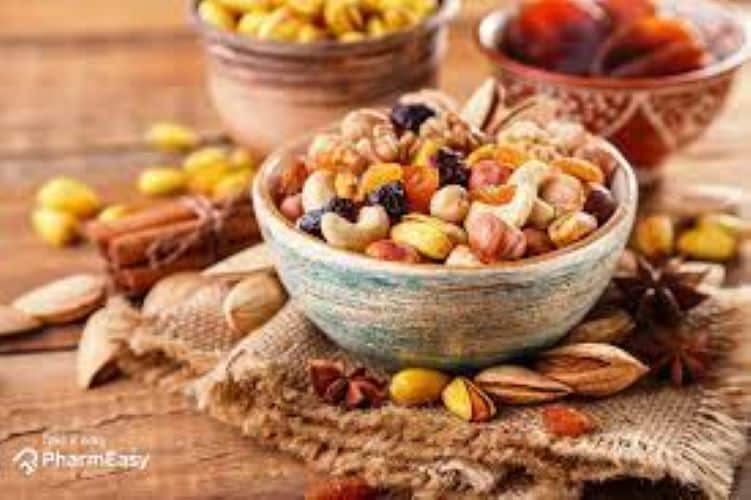Blog
5 Best Nuts to Increase Blood Platelet Count?

Introduction:
The clotting mechanism, which aids in wound healing and prevents excessive bleeding, relies on platelets, which are little blood cells. Thrombocytopenia, in which the platelet count falls below normal levels, raises the risk of bleeding and hinders clot formation, among other consequences. Although there are extreme cases that may require medical intervention, you can naturally raise your platelet count by eating foods like nuts. In particular, the platelet-boosting capabilities of peanuts, hazelnuts, almonds, walnuts, and cashews make them stand out. In this detailed article, we will examine the advantages of these nuts and how to use them to increase your platelet count.
1. Almonds:
Almonds otherwise called Prunus dulcis are not only a satisfying bite but also an excellent source of the nutrients that are beneficial to your health like keeping your platelets at the right level. Vitamin E is an antioxidant that is in abundance in these nuts. It is well-known that it protects cells against damage and boosts the platelet function. Vitamin E is required to keep the cell membranes intact, including platelet membranes, which are necessary to prevent their premature breakdown. Almonds also have copper in it, which is one of the trace minerals needed to produce red blood cells and platelets. Copper deficiency can suppress platelets levels, therefore, having enough copper intake is a vital factor for healthy blood.
There are many ways to get almonds into your diet, for example, by snacking on a handful of raw almonds or slicing them and adding them to yogurt, oatmeal or soups. Almond butter can also be added to soups and whole-grain toasts for an additional wellness power. Aside from almonds being a good source of nutrients, it also helps to maintain the levels of platelets at a healthy body stature.
2. Walnuts:
The scientific name of walnuts is Juglans regia and they are a great option for increasing the platelet count because they are very good for your health. Omega-3 fatty acids, including ALA (Alpha-linolenic acid), predominate in these nuts. ALA can decrease the inflammation level and, at the same time, the platelets function properly. Omega-3 fatty acids maintain a healthy heart by controlling the clotting of your blood and allow your platelet count to be just the right amount
Aside from protein, walnuts are also a great source of necessary minerals and vitamins like folate and vitamin B6. The vitamins and minerals nourish your blood. Folate takes part in manufacturing of DNA and RNA, which includes that of platelets, and vitamin B6 forms hemoglobin as well as many other proteins of the blood. Eating more walnuts could become as easy as adding them to your morning breakfast, baking with them, or eating them plain as an afternoon snack. Walnut is a delicious and natural source to elevate your platelet count. They can be raw, toasted or ground into powder.
3. Peanuts:
Peanuts are a well-recognized legume that is healthy both for the heart and body. It increases the platelet count. Folic acid (or folate) is one of the most crucial nutrients in peanuts. It is necessary for both the production and maintenance of healthy blood cells, such as platelets. Folate is one of the mineral responsible for making and repairing DNA which makes it difficult to form new blood cells and clot the blood when it is not enough.
As well, peanuts are a good source of protein which we need in order to form new blood cells, such as platelets. Not having enough protein can make it hard for your body to make enough platelets; so it is necessary to take in enough proteins to have healthy blood. Substituting a cocktail of peanuts in your breakfast, smoothie or stir fry can improve your platelet levels and help you in keeping a good body health in general.
4. Cashews:
Cashews, properly known as Anacardium occidentale, are creamy and delicious, and they also have the nutrients that helps raise your platelet count. Zinc is one of those essential trace elements that helps the immune system and facilitates blood clotting. These nuts are a good source of zinc. Zinc deficiency is associated with decreased platelet production, so ensure that you are getting adequate amounts of this mineral will ensure your platelets are healthy.
Another mineral that cashews have abundant of is magnesium, and this is vital for making blood flow properly and preventing platelets from clumping together. Magnesium deficiency has been associated with increased blood clotting and less healthy platelet numbers, thus eating foods like cashews which contain a lot of magnesium will aid platelet levels to stay normal. Cashews are a healthy snack and they can be consumed solo and sprinkled over soups, trail mixes, or stir-fries. Consuming these nuts daily should improve the functioning of your platelets and overall health of your blood.
5. Hazelnuts:
Hazelnuts, which are sometimes called filberts, are an effective nutrient source that can be used to increase platelet count. The vitamin K is abundant in these nuts. Vitamin K, a kind of fat-soluble vitamin, plays an important role in blood clotting and helps prevent severe bleeding. Many clotting proteins need K vitamin to be functional. One of these proteins is prothrombin which is converted to thrombin to form blood clots.
Besides, hazelnuts carry antioxidants, like vitamin E and flavonoids, which keep the blood cells healthy, preventing them from damage by free radicals. Platelet dysfunction and a lower platelet count are associated with oxidative stress. Platelet count can be maintained at a healthy level by eating nuts high in antioxidants such as hazelnuts. Hazelnuts consumption makes your platelets to work correctly and improves general health. They can be added to baked goods and desserts, used hazelnut butter as a spread or just served as crunchy topping for yogurt or cereal.
How to Increase Platelet Count Fast:
Over time, the platelet count can be increased by eating nuts. However, there are also some other ways you can do to increase the platelet counts instantly. Here are some things to think about:
Stay Hydrated: Ensuring that you have the adequate amount of water for your circulation and blood flow can be good for maintaining the health of your platelets. Make sure you drink 8 glasses of water per day, but if you suffer from fever, vomiting or diarrhea drink even more water.
Balanced Diet: In addition to nuts, include a wide variety of nutrient-dense food sources, such as fruits, veggies, whole grains, and lean proteins, that will give you enough vitamins and minerals that your body needs to produce platelets. To help your body produce red blood cells and keep your blood healthy in the long run, eat foods such as leafy vegetables, legumes, fortified cereals, and lean meats that are high in iron, vitamin B12, and folate.
Avoid Alcohol and Tobacco: If you are going to raise your platelet count, the wisest thing to do is to stay away from or limit these medications. They can affect both platelet function and their number. Cigarette smoke contains toxins that can harm blood vessels and platelets’ functions. Alcohol can halt the marrow production of blood cells and deteriorate the immune system.
Manage your stress: Over the time, chronic stress can hurt your immune system and blood health as a result of which doing such activities as yoga, meditation, mindfulness and deep breathing exercises can help you to maintain the level of your platelet counts. You have to look for more healthy ways to cope with stress, for example, hobbies, spending time with people who are close to you or talking to a therapist or psychologist.
Get Enough Sleep: Achieve seven to nine hours of quality sleep each night for your body to mend and regenerate, that is how you maintain your health generally and platelets production. To be able to obtain a good night’s sleep, develop a regular sleep schedule, include a relaxing bedtime routine and keep your bedroom comfortable and without distractions.
In conclusion:
Consuming nuts like peanuts, almonds, walnuts, cashews, and hazelnuts can give your blood the natural ability to remain healthy and to increase platelet count as well. In addition to being delicious, these nuts also contain essential nutrients such as minerals, vitamins, protein, antioxidants that boost platelets formation and performance. Your platelet count and overall health can be improved by having a diet rich in nutrients and following healthy habits like enough water intake, managing stress, enough sleep and not smoking or drinking alcohol.
Here are 10 questions on the topic 5 Best Nuts to Increase Blood Platelet Count?
Q1: Which nuts are known for their ability to increase blood platelet count?
A1: Several nuts are known for their potential to increase blood platelet count, including almonds, pumpkin seeds, walnuts, sunflower seeds, and flaxseeds.
Q2: How do almonds contribute to increasing blood platelet count?
A2: Almonds are rich in vitamin K, which plays a vital role in blood clotting. Consuming almonds can help improve platelet function and increase their count in the bloodstream.
Q3: What makes pumpkin seeds beneficial for boosting blood platelets?
A3: Pumpkin seeds are a great source of essential minerals like zinc. Zinc deficiency is linked to low platelet count, and consuming zinc-rich foods like pumpkin seeds can help increase platelet levels.
Q4: How do walnuts aid in improving blood platelet count?
A4: Walnuts are high in polyunsaturated fatty acids, particularly omega-3 fatty acids. These healthy fats contribute to overall cardiovascular health and can positively impact blood platelet count and function.
Q5: What role do sunflower seeds play in increasing platelet count?
A5: Sunflower seeds are packed with vitamin E, an antioxidant that supports healthy platelet function. Consuming sunflower seeds can help prevent platelet damage and improve their count in the blood.
Q6: How can flaxseeds assist in raising blood platelet count?
A6: Flaxseeds are a rich source of alpha-linolenic acid, a type of omega-3 fatty acid. Omega-3s have anti-inflammatory properties and can support healthy platelet function, thereby increasing platelet count.
Q7: Can incorporating these nuts into the diet replace medical treatments for low platelet count conditions?
A7: While these nuts are beneficial for overall health and can support platelet count, they should not be considered a replacement for medical treatments. Individuals with low platelet count conditions should consult healthcare professionals for proper diagnosis and treatment.
Q8: What is the recommended daily intake of these nuts to improve platelet count?
A8: There is no specific recommended daily intake, as it varies based on individual dietary needs and health conditions. However, including a handful of mixed nuts like almonds, pumpkin seeds, walnuts, sunflower seeds, and flaxseeds in the daily diet can provide essential nutrients and contribute to overall platelet health.
Q9: Are there any other foods or supplements that can be combined with these nuts for better results?
A9: Yes, incorporating vitamin C-rich foods such as citrus fruits, strawberries, and bell peppers can enhance the absorption of nutrients from these nuts. Additionally, maintaining a balanced diet with leafy greens, lean proteins, and whole grains supports overall platelet health.
Q10: Can these nuts be consumed in any form, or are specific preparations recommended?
A10: These nuts can be consumed in various forms, such as raw, roasted, or as nut butter. However, it’s essential to choose unsalted and unprocessed varieties to maximize their health benefits. Incorporating them into smoothies, salads, or as snacks can make it easier to include them in the daily diet.




